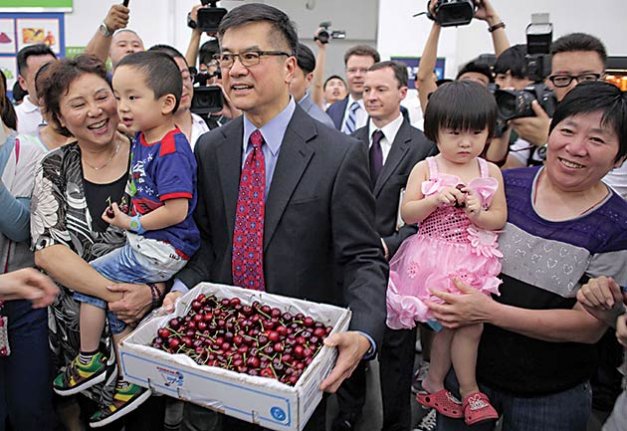
Ambassador Gary Locke hosted a promotion for Northwest cherries in July, visiting a Sam’s Club in Beijing and the offices of online retailer Tmall.com. Courtesy of Keith Hu, Northwest Cherry Growers
China put the sizzle in the 2013 Northwest cherry season, which otherwise was more of a fizzle.
Washington State growers lost crops to rain, marketers lost orders, and retailers lost their patience and bumped up their prices. Promotions had to be canceled in both the domestic and export markets.
As the last of the cherries trickled to market in mid-August, the tally was 14.6 million boxes—5 million less than forecast, 10 million boxes down from last year’s record crop, and perhaps 15 million boxes less than the potential production.
The only records set this season involved the weather. The first two weeks of May were the hottest in 20 years, while the last two weeks in May were the coldest and wettest in 20 years. After almost daily downpours in late May and early June, the weather turned exceptionally hot again, causing further problems, B.J. Thurlby, president of Northwest Cherry Growers, reported to his board members in August.
China
A lone bright spot was China, and even there the outlook seemed dim at first because of quality problems and high prices. Keith Hu, director of international operations at Northwest Cherry Growers, said U.S. cherries faced competition in the Guangzhou market alongside cherries from Spain, Turkey, and Italy.
Fortuitously, Hu was contacted by a representative from Tmall.com, a large e-commerce platform in China, who said they were expanding their sales of fresh foods and wanted to promote Northwest cherries. Hu said the company has a strong public relations team.
Tmall.com is similar to Amazon.com but doesn’t hold any inventory, Hu said. The fruit is handled by a third party.
Tmall.com ran two online cherry promotions, which were part of its presale experiment to help U.S. businesses gauge the interest of Chinese consumers before the products are shipped. Customers pay a small deposit for items that will be delivered later. In this case, the cherries were sold before they were picked, which allowed U.S. companies to ship only products that had been ordered, improving efficiency and reducing costs.
The cherries are shipped to Tmall’s customers in insulated boxes with the Northwest cherry logo and a flyer on Northwest cherries. Chinese consumers can receive the cherries within 48 to 72 hours of them being picked, according to Tmall.com.
During the first promotion, which ran from June 26 to July 11, Tmall.com sold 110 tons of Northwest cherries, which was 11 percent of the total volume shipped to China during that time frame.
During the second promotion, ten days later, they had difficulty sourcing good quality cherries and limited the volume to 30,000 cherry orders—or about 60 tons. They sold out in three days.
During the two promotions combined, Tmall.com sold more cherries than were sold in Malaysia, Singapore, and Thailand combined. More than 60 Chinese media outlets reported on the promotions.
“It’s been a great success for us,” Hu said. “We’re the first organization that sold products like that from the United States. It spread our product awareness throughout China to 35 different cities.”
Hu had already been working to accomplish the same thing the traditional way through the large supermarkets. He said he had not yet calculated how much volume Tmall.com sold in comparison with other retailers in China.
The Tmall.com promotions tied in with a Northwest Cherry Growers promotion featuring Gary Locke, former Washington State governor, who is now the U.S. ambassador to China and extremely popular there. “Gary Locke is a rock star in China,” Hu joked.
Tmall.com reports that U.S. foods are “red hot” in China, where consumers are increasingly turning to e-commerce to access foods from the United States because of concerns about food safety in their own country. The company saw sales of imported foods increase fivefold in the first half of 2013. •






Leave A Comment